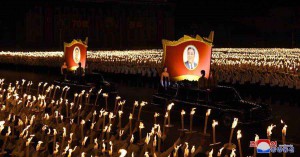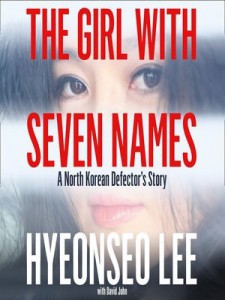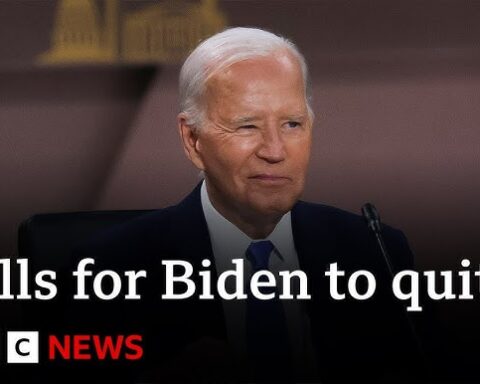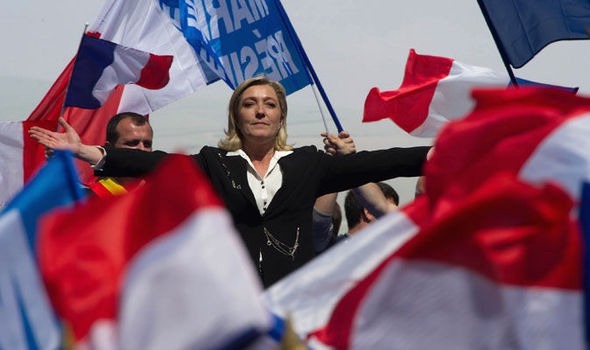I was watching some of the BBC news reports from North Korea’s military parade during the ‘Day of the Sun’ celebrations. It was a rare occasion in which select foreign reporters were allowed – under very close supervision (and minus their phones) – into the North Korean capital.
The celebrations happen every year, but the BBC’s presence at the invitation of the regime was planned to coincide with the rising tensions and international focus on North Korea and a feared military confrontation with the United States.
Whether that confrontation will actually happen is anyone’s guess. There’s a school of thought that China likes to keep the North Korean regime in place for geopolitical reasons; there’s another school of thought that it’s the United States that likes to keep the regime in place, as it provides the US with a reason for a military presence in the South China Sea.
The truth is probably in the middle.
Fears are perhaps justified, given that we have an unstable, megalomaniacal dictator in control of North Korea and parading his big weapons about: and a total non-entity of a US President whose purpose now seems to be solely to glory in American military might and parade their big weapons about (or to provide dramatic demonstrations of those weapons).
The title of this post might seem contradictory or confused: but that’s because it reflects a paradigm that, to me at least, is a little confused and probably contradictory.
It is very difficult to sympathise at all with the North Korean regime.
However, its justification of its desired nuclear arsenal is also difficult to argue with. It believes the US will attack – and it maintains its right to defend itself and to have a nuclear deterrent. Chinese newspapers have in recent days made the point that Kim Jong-un may be very conscious of what happened to both Saddam Hussein and Muammar Gaddafi when they both discontinued their WMD programmes and therefore lost their deterrent against foreign attack and forced regime-change.
Strategically, it is fairly hard to argue with North Korea’s need for maximum defensive capabilities (and the ‘offensive’ capabilities are simply part of the defensive capabilities, as it is the threat of North Korean
nuclear missiles being able to hit South Korea, Japan, or even the US itself that would provide the deterrent to US invasion or attack): it is probably seen as the only way for the regime to survive.
Whether that regime deserves to survive is another question.
Besides, there are at least two important ways to frame that question, one being geo-political and one being purely in terms of North Koreans themselves.
An interesting fact about North Korea is that it is not the year 2017 over there, but the year 106. This is because the country bases its calendar on its founder Kim Il-Sung’s date of birth (15th April 1912). If the general consensus about North Korea is to believed, however, it may as well still be 1912.

The widely shared images of North Korea as seen from space seem to capture people’s imaginations: they show a country in near-total darkness at night, surrounded by neighbouring countries lit up in the way most modern countries are. Electricity, amenities, even food, are reported to be in permanently short supply across large parts of the country.
It is sometimes difficult to formulate a clear opinion about North Korea. This is partly because it is the most enclosed, secretive state on the planet and very little information gets out, and partly because international perception of the country is usually so bound up in geo-politics and propaganda that it is difficult to know for sure what is true and what isn’t.
But what is perhaps fascinating about North Korea is that its society and population seems to exist in a carefully-maintained vacuum.
From what we do know – or at least what we think we know – about North Korea, there is very little of a positive nature to be said about it.
From all accounts, a bleak Dystopia: an immensely oppressive, totalitarian state in which virtually no liberty or freedom exists of any kind and in which people are indoctrinated from a young age to swear total allegiance to the cult of personality that the dynastic dictator embodies. A society stuck in a kind of Communist/Totalitarian bubble where the events or innovations of the outside world are kept at bay, and where there are longstanding claims about vast prison camps where dissidents or opposition are tortured.
There have long been harrowing stories of mass starvation, with poor citizens forced to eat grass, as well as claims of the withholding of food supply being used as a weapon against parts of the population. Human rights abuses have long been claimed to be on an unparalleled scale (in contemporary terms), with even hair-cuts limited to the 28 state-approved styles.
The UN’s commission on human rights in North Korea, which in 2014 gathered evidence for a year, reported that there was compelling evidence of torture, execution and arbitrary imprisonment, deliberate starvation and a total denial of free thought or personal belief. It refers to “an almost complete denial of the right to freedom of thought, conscience and religion” in a society in which the citizens are subject to an all-encompassing system of indoctrination from childhood and throughout their lives.
It also described a vast network of secret prison camps where hundreds of thousands of North Koreans are believed to have died through starvation or execution or other means (it offered an estimate of between 80,000 and 120,000 political prisoners still being held).
Some of this might be highly politicised or propaganda-based, aimed at maintaining the appearance of North Korea as a dangerous enemy: but much, probably most, of it is seemingly true.
A lot is gleaned from those who’ve escaped North Korea as refugees or defectors.
The best known is probably Hyeonseo Lee, whose biography The Girl With Seven Names was a bestseller around the world. In it, she describes, among many other things, how she “saw a public execution aged seven, the victim’s brains exploding from machine-gun fire. For us that was normal life, it didn’t seem strange. Because we were brainwashed, we thought these people deserved to die.”

Park Sang-hak, another defector, was interview in this fascinating piece in The Guardian last year, and describes his surprise at discovering that “in Europe, people did not have weekly self-evaluation sessions [where citizens must confess to ‘wrongdoings’], which were a source of great stress for our people.”
As much as we might think about the millions living within North Korea’s Dystopian state (some of them no doubt wanting to escape, but many others probably entirely and effectively conditioned to believe in the state), the story of escapees and defectors is often just as sad or tragic.
Aside from obvious problems like worrying about family left behind or like identity crises, there are also serious problems with adjusting to a new world, with accounts of people struggling to integrate into a world outside of North Korea that is so unfamiliar to them. While some of course are able to celebrate their new lives or make the most of their new circumstances, others find it hard to adjust to personal liberties, too much choice or the sheer overload of information and modern amenities.
Figures cited by some organisations indicate that one in seven ‘defector deaths’ are suicides.
It is probably hard for most of us to imagine it, but there must be a great deal of difficulty in trying to re-adjust from a lifetime of mental conditioning (since childhood) and a totally closed society that demands total obedience and conformity. Essentially, it isn’t just trying to adjust to new lifestyles, technologies or ideas, but the need to reconstruct your entire understanding of the world and your place in it.
As Park Sang-hak said in his interview, “All defectors ask the same question: how could our country lie so completely to us?”
Which is reminiscent very much of a conversation I remember once having with a lady who’d formerly lived in Soviet Russia, in which she had told me how dismayed she had been when she’d gotten out of Soviet territory and experienced the West. She said she had realised immediately that she’d been lied to her entire life about a Western world that was supposedly falling apart and full of starving, miserable people.
__________
I am not forwarding any answers here, nor pretending to have any.
And, at any rate, human rights abuses, poverty and the plight of much of the population are not the reason the US, the Trump administration or anyone else is threatening North Korea – it is purely on account of the regime’s weapons development and testing. So, perversely, while I think the North Korean state and regime is probably just as despicable and inhumane as we’re told it is, the one thing I consider justified is precisely the right of a sovereign nation to build up its defenses to deter imperialist intervention.
It’s just a shame those defenses are being built up to protect something that doesn’t seem to be worth protecting.
The Korean War is, technically, not over, as only an armistice was put in place in 1953 and not a peace treaty. However the ‘North Korea problem’ resolves itself, along with the relationship between North and South Korea, it is historically the Russians and Americans who are to blame for the Korean situation.
A by-now familiar story of how, decades or even centuries later, conflicts and crises continue in the world as a by-product of actions by superpowers and empires before many of us were even born.
______________





An excellent analysis. And you’re right – awful as it is, and I am sure it is, North Korea has as much right as anyone else to develop a nuclear arsenal. In the same way, what justification can there be for Israel to have an atomic bomb and not Iran?
Thanks, JB – yes, the question with Israel always (and rightly) should be raised in this regard. From all accounts, it’s a pretty big nuclear arsenal Israel has, even though it remains secretive and undeclared.
Thanks! This was very objective and thought provoking. The plight and misery of the people of NK is for the most part unfathomable for people living in Western Cultures; truly we can only pray for a peaceful liberation.
If I may add to the discussion… so many masses across the earth live in comparable miserable and impoverished state as the average person in NK, but by all means the NKs top the list.
On the topic of information overload: When I was living in Miami, I was once asked by a friend to go to the airport and pick up a relative of his who had won entry into the US through a US Visa lottery. Having some knowledge of the general dearth that existed in Cuban society, I decided to take this person for an evening drive around the city and toured him though downtown along the skyline of the city and then took him to eat and to a few stores including Home Depot as I watched his reaction to his first time exposure to the plethora of substance in any US city. He was wide-eyed and dumbfounded and said to me that he didn’t have words to describe what he was seeing and that nothing that he had experienced that evening existed in his homeland.
It is so difficult to fathom that NKs may experience difficulty adapting to outside worlds… I do much volunteer work in US prisons and I can further relate to the lack of ability of some individuals to be able to integrate (or reintegrate) into a society where they are required to reason and function independently. In South Florida it is not uncommon to hear of Cuban exiles who would like to repatriate. Sadly, people living under regimental regimes are basically living in prison nations. I had an experience a few years ago where an inmate in his late 30’s called me up one night to tell me he had been out for 10 whole months now – and then excitedly added that it was the longest he had ever been out… He’s still out: but others normally go back in – here it is called recidivism to a regimen that secures them 3 hots and a cot – it is one alternative to suicide. It only makes us wonder what the suicide rate is in NK.
Many other thought provoking question can be concocted concerning NK… There’s a lot to be said about known NK abductions of foreigners from all over the world, and particularly from Japan. One can also only wonder if they play a significant role in harvesting human organs from their populations to supply demands of the macabre medical industries of the region. In a geopolitical sense one must ask if the situation of NK could be separated from the dismal track record of geopolitics in the middle east and be instead better compared to the two Germanies that shared a common culture and were reunified into what has become a powerful industrial free state in a relatively short period of time. Speaking of Germany, it would not be surprising if sometime in the near future atrocities surpassing those the allied forces uncovered in Hitler’s labor and death camps were found to exist on a similar or grander scale in NK!
Thanks again for covering this topic!
Movie: Shawshank Redeption
Thanks, TiSTF, for a really interesting contribution to the subject and for sharing your experiences.
I thought it was a really interesting – if sad – subject, which you have expanded on further in your comment: specifically, this issue of struggling to adapt or acclimatise to a new society or way of life when you’ve previously been conditioned to think and live in a very small, circumscribed way.
Well said bro. We need a break-through. Something gets us rising-up in the midst of their crashing and realign their realign. Reading this – and ‘Beware the Dogs of War: Is the American Empire on the Verge of Collapse?’ By John W. Whitehead – am aghast. Need… Break Through.
NK ruler/s hate Christians more than just about anywhere else in the world. Certainly tops the persecution list. Because this ‘secular’ state is the deeply religious one, in requiring outward allegiance in their worship of Kim Il-sung. Idols physical, for public bows and confessions to. Formed up in a place of early 20th century spectacular church growth, known then as the ‘Jerusalem of the East’. This Juche ideology (Marxism and Confucianism) was a knowingly perverted counter-reaction. A sick Soviet fed mix, now going rogue-ish. We suppose? Not sure we know what this Kim finally is, although likely more puppet than pioneer. Perhaps though, strings have been cut to serve the regional and Globalist combines? United yet competing. Certainly, the outward lies and deception US-wise is likely. NK a threat to gain something or/if no budging, a false-flag and first major cull?
Listening to the sturdy and engaging ‘Dave Acton Checking In’ (YT) and like you, there’s always ‘glory in American military might’. He additionally speculates how all’s ‘designed to boost Wall Street’ and ‘that bomb’ – is connected. Announcements, superfluous and ugly US B61-12 and 180 in all going to; Belgium, Germany, Italy, Netherlands and Turkey.
Thanks for a concisely put together of a number of smart and insightful angles. Enough from me, could comment on but know it stirs and received
Thanks Mark. On the ‘hates Christians’ element; I guess it extends to a disdain for all religions. I’m guessing there aren’t any ‘Christians’ in N/Korea. I’d be interested to know if there *were* any prior to the Communist regime or not.
Without researching, I don’t know to what extent but yes, as in Jesus day, religion permitted as long as you bow to god-governmental leader. Be free to (?) under or alongside, the worship of Kim. Aside from m’ultimate-battle beliefs, the sociological explanation for the untold 1000’s locked up for Christ, was the spectacular growth steadily through the 19th century, exploding early in the 20th. Today est. 200-300,000 in FEMA-camps. Kept together, for fear of spreading among the prison pop – this, once heard. A quick look and from late last year; ‘Christians in North Korea are being enslaved, raped, tortured and killed at an alarming rate under Kim Jong-Un’s leadership, according to a new report from Christian Solidarity Worldwide (CSW).’ And oh Hallelujah, there’s hidden from the community churches operating. They must rock the heavens with their praying, methinks. Question Jay Dyer is raising, the obviously CIA and how far controlled by, view. Haven’t listened yet but will. I thought China had the strings and played pull-in and let-go to suit. But recently made aware of Jong-Un’s history and connections West, probably more, “this one punch, that one Judy”.
Of course this begs the question CIA and Beijing, or how much CIA is… Last thought ‘n plug; Daniel Estulin went on AJ beginning of the month. At the end of the interview, drops his thesis, plus between the lines chides those not analysing – unsaid/implied – ‘incidents’ being false-flags. Estelin’s take and solution-focused Robert David Steele is where I’d concur. Add you, James (‘Crimes’) and Jay D. That be a wide enough web for me.
Writ on the Hop. Revise: 2-300,000 in a prison called NK, maybe 70 thousand in the Gulags.
Apologies.
Good work, man.
A Chinese friend who is something of a nationalist (not belligerant but quick to defend the Chinese system and ruling powers) once told me candidly that North Korea is ‘China’s mad dog’. The thought has always stuck with me. It even got me wondering who is ‘the West’s mad dog’ – and, of course, it didn’t take long to make the obvious comparison (I mention no names).
Thanks for this thoughtful overview of what is surely the most politically isolated nation on earth – I really can’t see how any threat of war can achieve anything other than strengthening an deeply-oppressive and entrenched militaristic regime. If Trump was serious about doing deals (and he plainly isn’t) then the trick here would surely be to forge a deal with Beijing that if Pyongyang abandon their nuclear arsenal, the US would in turn move its bases away from China. But sadly no negotiation of this sort will happen soon. Instead it moves us all another step closer to the unthinkable.